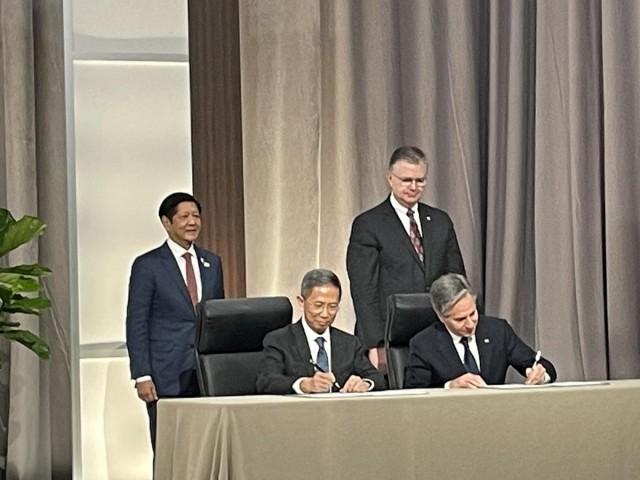PH, US sign '123 Agreement' on nuclear cooperation
SAN FRANCISCO, USA - The United States and the Philippines on Friday (PH time) signed a landmark deal that would allow Washington to export nuclear technology and material to Manila, which is exploring nuclear power in its bid to decarbonize and boost energy independence.
The "123 Agreement," signed by Philippine Energy Secretary Raphael Lotilla and US Secretary of State Anthony Blinken, will provide the legal framework for civil and nuclear-related investments, particularly nuclear power, in the country.
"We would be more happy to pursue this path with the United States as one of our partners," said President Ferdinand "Bongbong" Marcos Jr., who witnessed the signing,

MPC POOL PHOTO
"The signing of the Philippines-United States Agreement for Cooperation Concerning Peaceful Uses of Nuclear Energy or the 123 Agreement is the first major step in this major regard, taking our cooperation on capacity building further and actually opening the doors for US companies to invest and participate in nuclear power projects in the country," he added.
The signing took place at the Asia-Pacific Economic Cooperation (APEC) Summit here.
In a statement, the US Embassy in Manila said the agreement will facilitate and enhance the two countries' cooperation on clean energy security and strengthen their alliance.
It added that the agreement "lays out a comprehensive framework for peaceful nuclear cooperation between the Philippines and United States based on a mutual commitment to nuclear nonproliferation and is required by U.S. law to allow for the transfer of nuclear equipment and material for peaceful uses."
Through the agreement that will allow access to US material and equipment, both countries will be able to work together to deploy advanced new technologies, including small modular reactors, to support climate goals as well as critical energy security and baseload power needs within the Philippines, the embassy also said.
This agreement also establishes nonproliferation criteria that both governments must uphold such as observing specific standards for covered items used in civil nuclear energy programs, including International Atomic Energy Agency safeguards; physical protection of covered items; and limitations on enriching, reprocessing, and transferring specific items without the other party’s consent.
Marcos said he was informed that the "123 Agreement" was the fastest that the US has come to.
"I look forward to seeing this agreement in action in the years to come. Nuclear energy is one area where we can show that the Philippines-US alliance and partnership truly works, for our peoples, our economies and the environment," he said.
For his part, Lotilla recognized the President's commitment to adopt nuclear energy and assured that the agreement with the US was compliant with the standards of the International Atomic Energy Agency.
“Under the leadership of President Ferdinand Marcos Jr., the negotiation of the present agreement with the US was made possible, its predecessor agreement having expired in 1998. Every step of the way, the Agreement recognizes adherence to standards and safeguards set by the International Atomic Energy Agency,” Lotilla said.
He also thanked the President for supporting the negotiations that finally led to the signing of an agreement.
“On behalf of the member agencies of the Philippine Nuclear Energy Program-Inter-Agency Committee, we would like to express our sincerest gratitude to President Marcos, Jr. for his support and to the two countries’ respective negotiating teams for successfully concluding the negotiations leading to the signing of this Agreement,” Lotilla said.
The Energy chief said the new deal facilitates bilateral cooperation in a wide array of other peaceful uses of atomic energy — all supportive of various Sustainable Development Goals — including plant breeding, livestock production, insect pest control, soil and crop management, water use efficiency, plastic waste disposal, food safety, health, and medicine.
The signing marked the culmination of the negotiation process launched by US Vice President Kamala Harris during her historic trip to the Philippines in November 2022.
In his first State of the Nation Address (SONA) last year, Marcos expressed his desire to adopt nuclear energy as part of the country’s power mix, but said the government’s strategy has to be rethought.
“I believe it is time to re-examine our strategy towards building nuclear power plants in the Philippines,” Marcos said back in July.
“At present, our demand for energy far exceeds our reliable supply. We must increase the level of energy production... We must look at every possible option that would be appropriate for the Philippine situation,” he added.
During his state visit to Washington in May, Marcos met with officials of Ultra Safe Nuclear Corporation, which is a US-based firm global leader and vertical integrator of nuclear technologies and services.
“Our search for new power sources should always be with an eye to improving the energy supply mix between traditional and renewable sources,” Marcos said during his SONA.
The Philippine Nuclear Research Institute had welcomed the civil nuclear cooperation talks between the Philippines and the United States. —with Reuters/KBK, GMA Integrated News




